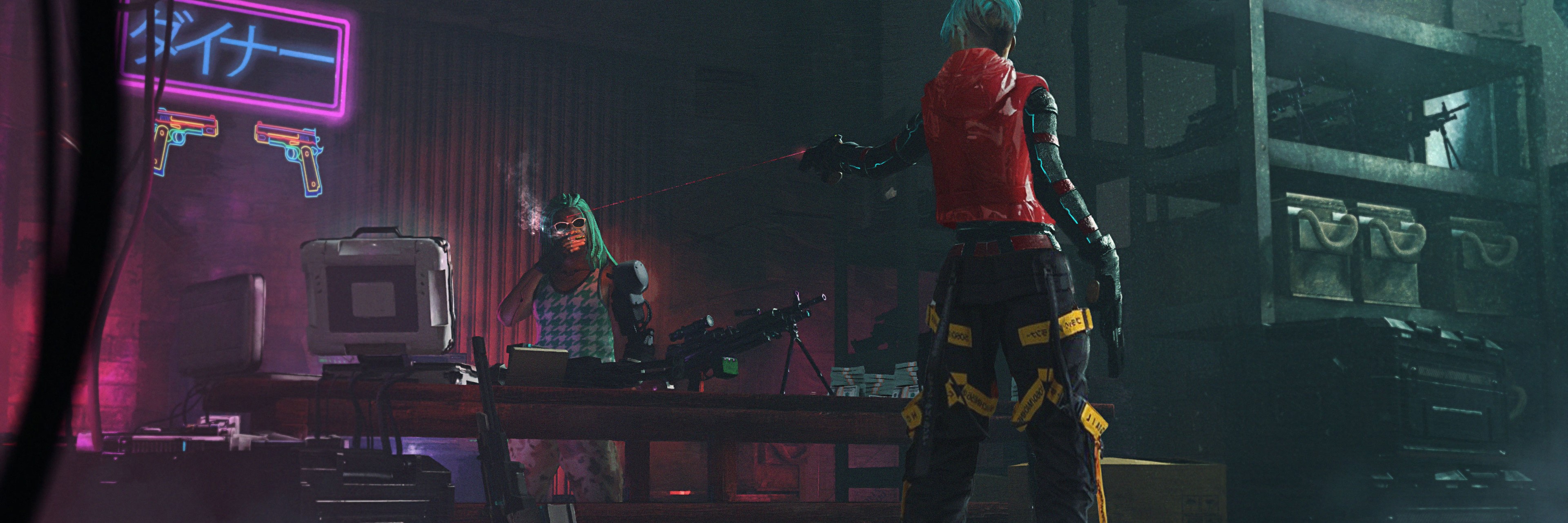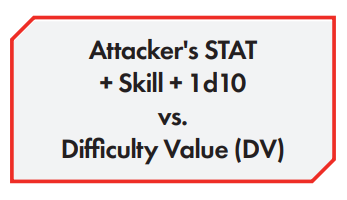Resolving Action with Skills
What is a Skill?
A Skill is something your Character knows how to do thanks to their training. The level of your Skill represents how trained your Character is in that activity. Each Skill is linked to a STAT that represents natural ability. That's why you add STAT + Skill together on a Skill Check. This creates your Skill Base.Skill Check Resolution
Whenever your Character tries to do something, there's always the question of whether they'll succeed or fail. Sometimes the task is so easy that it's obvious; for instance, taking a step forward without falling. In those cases, tell the GM what you're doing, and no die roll is needed. But if you're trying to take a step on the deck of a ship pitching wildly in a driving rainstorm, walking might be very difficult indeed. These are the situations that call for a Skill Check. There are two ways to resolve Skill Checks: The first is to resolve your Skill against another living thing or person's Skill (like trying to persuade someone to do something for you). To do this, you, the Attacker, add your relevant STAT + Skill + 1d10 die roll against your opponent, the Defender's own relevant STAT + Skill + 1d10 die roll. The result of your opponent's STAT + Skill + 1d10 die roll is also known as the Difficulty Value, or DV, the amount your STAT + Skill + 1d10 will need to beat in order for you to succeed. In case of a tie, the Defender always wins. The second way is resolving your Skill against the difficulty of a situation (like picking a lock or driving a car). The GM determines how long the task you want to perform will take and uses the table below to decide which rating best describes the difficulty to perform the task, the Difficulty Value (DV). Then you add your STAT + Skill + 1d10 and try to beat the Difficulty Value (DV) the GM assigned to the task you want to perform. ▶ Critical Success ◀When you roll a natural 10 on your d10, you've scored a Critical Success. Roll another 1d10 and add the result to your first roll. If you roll another 10, you do not score another Critical Success. ▶ Critical Failure ◀
When you roll a natural roll of 1 on your d10, you've scored a Critical Failure. Roll another 1d10 and subtract the result from your STAT + Skill + the first roll. If you roll another 1, you do not score another Critical Failure. ▶ Modifying the Attempt ◀
Sometimes conditions beyond your control may make it harder to perform a task. For example, a Simple (DV9) Skill Check is a whole order of magnitude tougher during an earthquake. These external conditions are called Modifiers. When the GM decides a Modifier applies to your Skill Check, you will subtract the Modifier Value from your roll. Here are some typical examples of conditions that might cause your GM to call for Modifiers (they are cumulative). ▶ Trying Again ◀
If you fail a Skill Check, you can't try again unless your chances of success have improved for some reason— you took longer, used a better tool, or you (or one of your friends) made a Complementary Skill Check. ▶ Complementary Skills ◀
Complementary Skill Checks are where the use of one Skill directly affects the use of a subsequent Skill. At the GM's discretion, a good roll in one Skill (which can even be rolled by another Character) may confer a +1 bonus to the subsequent use of a related Skill, so long as the complementary nature of the two Skills makes sense. This +1 bonus only affects a subsequent attempt once, and Complementary Skill bonuses do not stack. ▶ Taking Extra Time ◀
Taking Extra Time can also give you a bonus to your Skill Check. When the GM tells you how long a task will take to complete, you can get a single +1 bonus to your Skill Check for taking four times longer. ▶ When You Don't Have A Skill ◀
When you just don't have a Skill to use, but you want to try anyway, you have one option: Simply use the STAT that the Skill you don't have is linked to and add it to 1d10. That's all you get. You are relying purely on your STAT. ▶ Using Your LUCK ◀
Before you roll, you can dedicate a portion of your remaining LUCK Pool (which holds LUCK Points equal to your LUCK Statistic, and which refills at the beginning of each game session) to a Check, which increases the roll by +1 for each point in your LUCK Pool that you expended. LUCK is a powerful force that can allow the otherwise impossible to become attainable. Simple? Remember: to do pretty much anything in Cyberpunk RED, simply combine a STAT, a Skill, and a d10 roll against a Difficulty Value (DV). If your Check is over that amount, you did it! Everything else is just window dressing! See all skills here.
Remove these ads. Join the Worldbuilders Guild













Comments